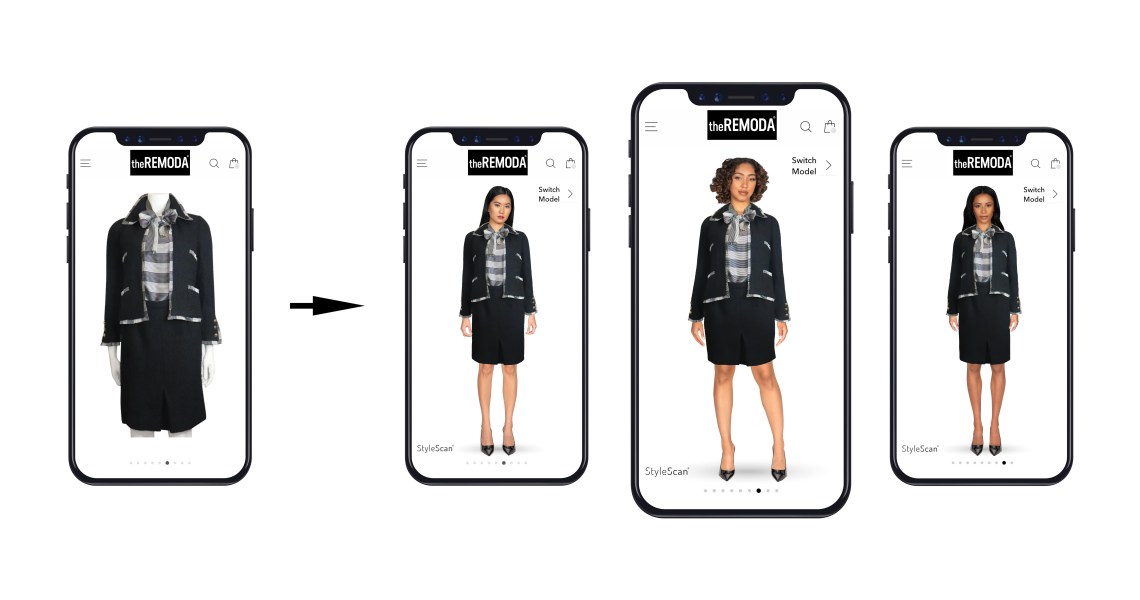Today, San Francisco-based luxury consignment platform theRemoda announced its partnership with virtual dressing platform StyleScan.
With Farfetch and Walmart both investing in digital dressing technology, the move signals a shift toward carving out a competitive advantage with inclusive, on-model imagery. StyleScan uses AI and existing product imagery and measurements to show a style on the digital model of the fitting size, with the product page stating its size. Using digital models cuts costs and is more manageable, compared to enlisting IRL catalog models. That’s especially true for the resale sector, where every item sold is a unique SKU.
Catalog models can cost between $50-$200 an hour, sometimes shooting hundreds of items per day, with additional costs for photography, studio hire and fees. Other companies like Looklet are providing solutions — for its part, Looklet digitally dresses a bank of models it’s photographed with each new style.
TheRemoda says its differentiation point is offering quality customer service, with an e-commerce experience that’s paramount to its customers who are buying vintage Chanel. Sizing has changed dramatically in the last hundred years, so luxury consignment customers can greatly benefit from seeing a style on a model of their same size.
However, digital dressing is catching on among traditional e-commerce players. In the last year, both Walmart and Farfetch announced partnerships with digital dressing company Zeekit, which Walmart acquired last year. Prior to the acquisition, major brands and retailers including Macy’s, Adidas, Tommy Hilfiger and Levi’s used Zeekit’s technology. Zeekit specializes in both digital models and virtual try-on.
Surprisingly, the wider vintage and resale space has yet to trial this type of technology, even as inconsistent sizing remains a hurdle. Most luxury consignment companies, like The RealReal and Vestiaire Collective, don’t hire models to showcase the items as costs can be prohibitive. The RealReal uses mannequins, while Vestiaire Collective features laydowns and clothing on hangers. According to theRemoda founder Olya Dzilikhova. “Having inventory in so many sizes isn’t always compatible with a photoshoot, which is why a lot of online resale platforms display garments on mannequins.” The RealReal and Vestiaire Collective did not respond to requests for comment on plans to invest in digital dressing services.
According to Dzilikhova, the consignment industry has always been limited, in terms of online visualization. And yet, as with all e-commerce, presenting the best online customer experience is key to customer retention. As StyleScan offers a range of 12 different body types and skin tones, digital models can make the resale market more inclusive, as well. StyleScan plans to expand to 50-100 models that include trans and disabled people in the next year. StyleScan’s conversion rates show that consumers are more likely to make a purchase when they identify with a model. Its partner brands include U.K. fashion brand Natasha Zinko, multi-brand luxury retailer Odds Concept and jeweler Millianna. Milliana, for one, increased its conversion rate to 44% in the month after launching StyleScan models.
Ad position: web_incontent_pos1
StyleScan recently completed a $1 million funding round last month, as reported by Fortune’s Term Sheet, bringing its total seed round capital to $3 million.
“The e-commerce that we know hasn’t really changed in the past 10 years. Everything is being bettered with technology, and yet our shopping is the same,” said Larissa Posner, CEO of StyleScan. The startup is also trialing with some of its bigger partners its StyleSwap technology, which allows multiple brand pieces to be shown on one virtual model. Posner hopes to offer this in the vintage sector, as well.
On-model imagery also gives brand partners across e-commerce and consignment an advantage in web searches. Consumers are more likely to click on images of a real person, especially when their body type, skin tone and gender are represented. In its trial run in June, theRemoda saw a 99% increase in active sessions, compared to the month before.




